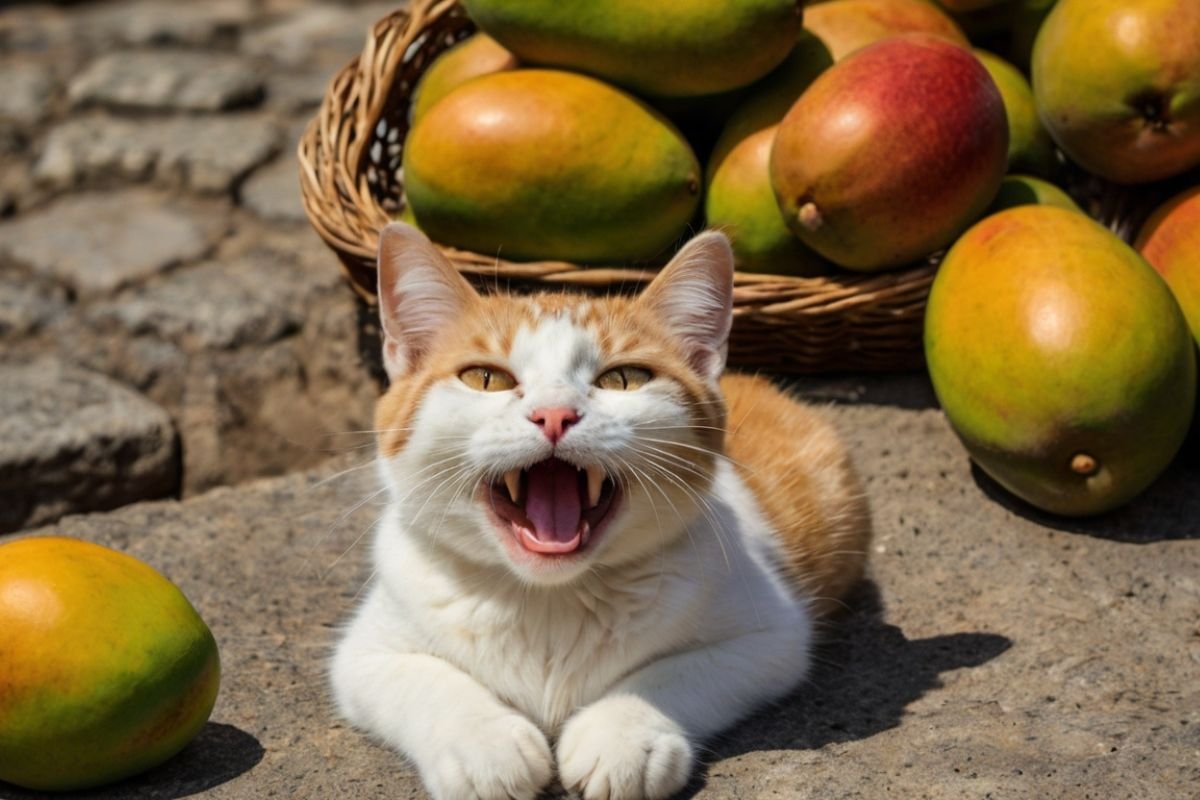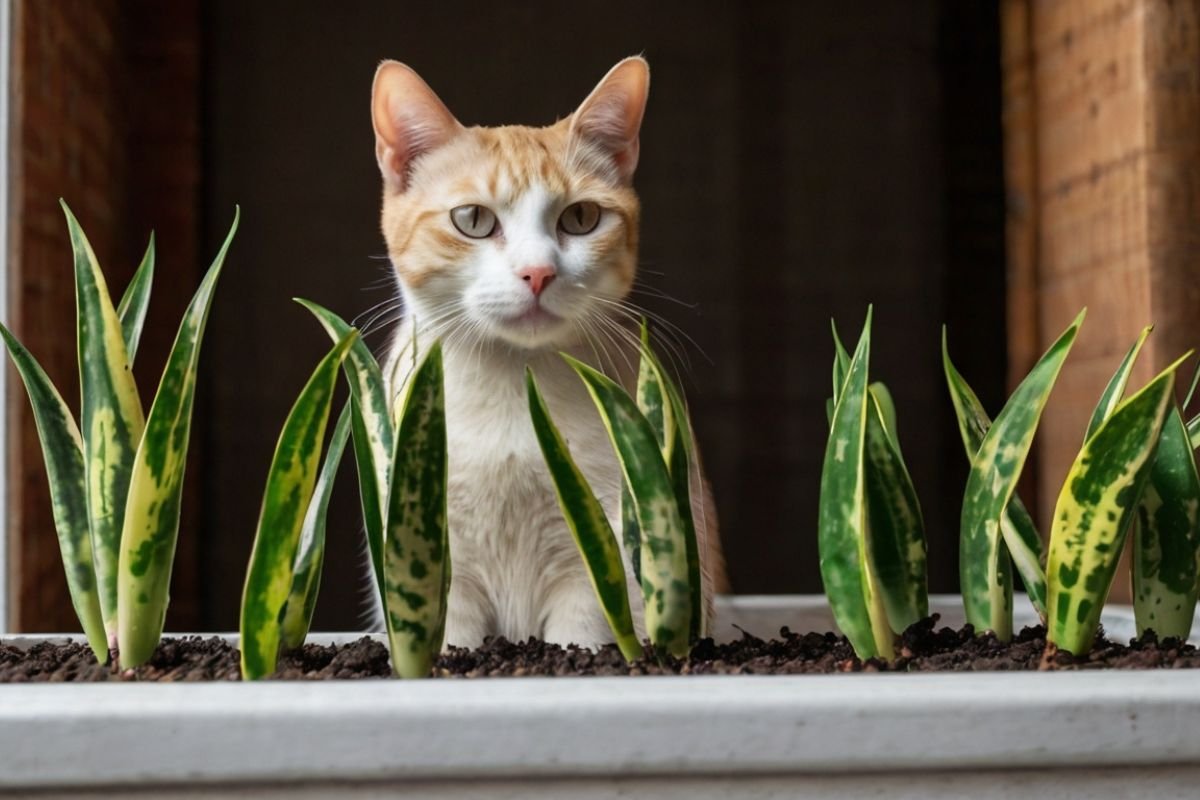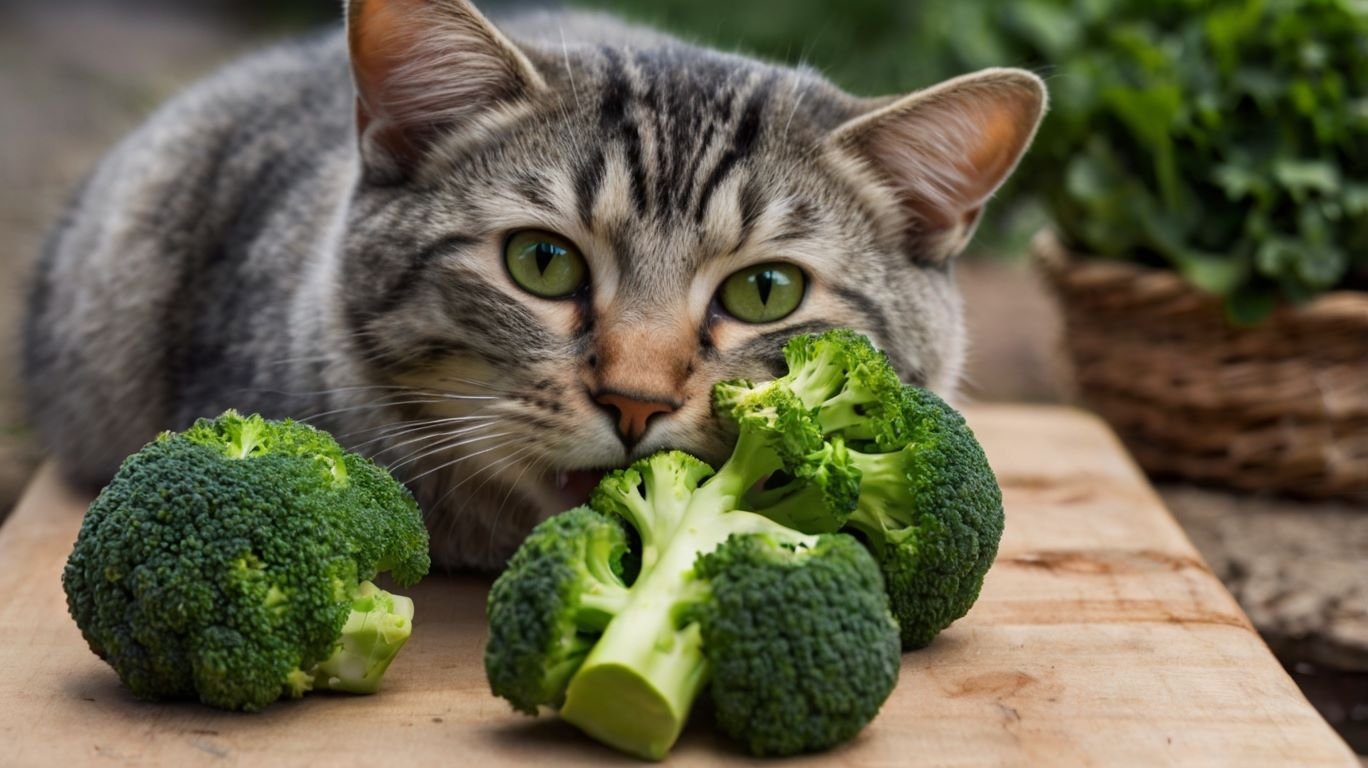Blueberries might be a superfood for us, but what about our feline friends? As Rio’s human (he’s my curious two-year-old orange cat), I’ve often wondered which human foods are safe to share.
Let’s explore whether these tiny blue fruits are friend or foe to our whiskered companions.
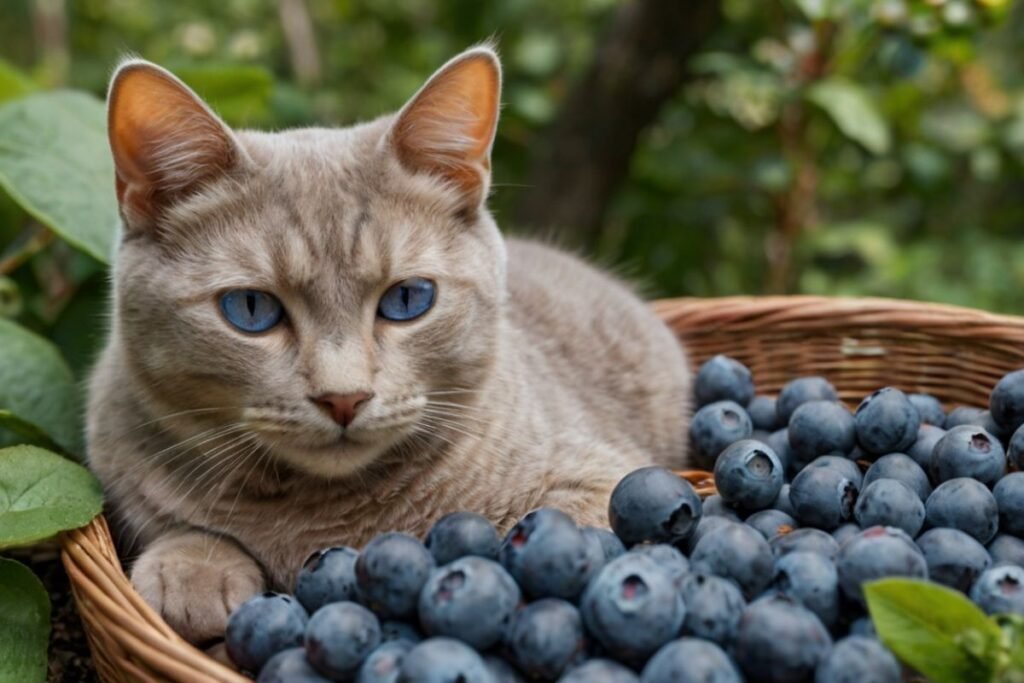
Table of Contents
Are Blueberries Safe for Cats?
Yes! Cats can eat blueberries in small amounts. These little berries are not toxic to cats. Unlike foods such as chocolate, grapes, or onions that can harm cats, blueberries won’t cause major health issues.
But there’s more to the story than just safety. Cats are what we call “obligate carnivores.” This means their bodies are built to eat mostly meat. Their wild diet would consist mainly of small prey animals, not fruits or veggies.
The truth is, cats don’t need blueberries at all. Their bodies don’t need the same mix of fruits and veggies that humans do. Yet, many cats still show interest in these sweet little berries.
My cat Rio once stole a blueberry right off my plate! He batted it around the floor like a toy before giving it a tiny lick. While it made me laugh, it also got me thinking about whether this was a good snack for him.
Also read, Can Cats Eat Strawberries?
The Nutritional Value of Blueberries
Blueberries pack a lot of good stuff into their small size. They’re low in calories but high in fiber, vitamins, and antioxidants.
Here’s what’s in these tiny blue powerhouses:
- Vitamin C: Helps boost the immune system
- Vitamin K: Aids blood clotting
- Fiber: Supports good digestion
- Antioxidants: Fight harmful free radicals
- Water content: Helps with hydration
- Low sugar (compared to many other fruits)
- Few calories
For humans, this makes blueberries a “superfood.” But cats have very different dietary needs. Their bodies process nutrients in unique ways.
For instance, cats make their own vitamin C. Unlike humans, they don’t need to get it from food. This particular benefit of blueberries isn’t very useful for cats.
Still, some parts of blueberries might be good for cats too. The high water content can help cats stay hydrated. And the antioxidants might help fight cell damage, just like they do in people.
Potential Benefits of Blueberries for Cats
While cats don’t need fruit in their diet, blueberries might offer some small benefits:
- Antioxidant boost: The antioxidants in blueberries fight free radicals that can damage cells. This might help reduce inflammation.
- Low-calorie treat: At just about 1 calorie per berry, they’re a better choice than many store-bought cat treats that can be high in fat.
- High moisture content: Many cats don’t drink enough water. The high water content in blueberries can add a tiny bit more hydration to their diet.
- Fiber source: The fiber in blueberries might help cats with mild constipation issues. But too much can cause the opposite problem!
- Mental stimulation: New foods, textures, and smells can be fun for cats to explore. Rio loves to bat blueberries around before he tries them.
- Bonding: Sharing safe human foods in small amounts can be a nice bonding time between cats and their people.
These small benefits don’t mean cats should eat lots of blueberries. Think of them as an occasional tiny treat, not a diet staple.
Potential Risks of Feeding Blueberries to Cats
Even though blueberries aren’t toxic to cats, there are still some risks to be aware of:
- Digestive upset: Cats’ bodies aren’t made to digest fruit. Too many blueberries might cause stomach pain, diarrhea, or vomiting.
- Choking hazard: Whole blueberries could be a choking risk for some cats, especially if they try to swallow them without chewing.
- Sugar content: While lower in sugar than many fruits, blueberries still contain natural sugars that aren’t ideal for cats.
- Allergic reactions: Just like people, some cats might be allergic to certain foods. Keep an eye out for symptoms such as scratching, inflammation, or difficulty breathing.
- Dental issues: The sugar in blueberries could stick to teeth and cause dental problems over time.
- Filling up on non-essential foods: If cats fill up on treats like blueberries, they might eat less of their regular food that gives them the nutrition they truly need.
I learned about these risks the hard way when Rio had a mild case of diarrhea after I let him have a few too many blueberries. He was fine after a day, but it was a good reminder to keep treats truly occasional.
How Many Blueberries Can a Cat Eat?
Moderation is key when giving any treat to cats. Their small bodies mean even tiny amounts of new foods can have big effects.
As a general rule, treats should make up no more than 10% of a cat’s daily caloric intake. For most cats, this means all treats combined should be just a small part of what they eat each day.
For blueberries specifically, start very small:
- First time: Just a tiny piece of one berry
- If no bad reactions: One whole berry might be OK
- Maximum: One to two berries once or twice a week
Keep in mind that tiny portions are more than enough for cats. Their bodies aren’t built to process fruits, so less is more.
When I give Rio a blueberry treat, it’s only half a berry at a time, and only once in a while. This keeps it special for him and safe for his system.
How to Introduce Blueberries to Your Cat
If you want to try giving your cat blueberries, do it safely:
- Wash them well: Always rinse blueberries thoroughly to remove dirt, pesticides, or chemicals that could harm your cat.
- Start tiny: Begin with a small piece of one berry to see how your cat reacts.
- Mash it up: For the first try, mash the piece to make it easier to eat and digest.
- Watch closely: After giving your cat blueberry, watch for any signs of digestive upset or allergic reactions.
- One new food at a time: Don’t introduce multiple new foods at once. This makes it hard to tell which food caused a problem if one occurs.
- Be patient: Some cats might need time to get used to new foods. Don’t force it if your cat isn’t interested.
When I first gave Rio a bit of blueberry, I mashed it up and put a tiny bit on my finger. He sniffed it for a long time before taking a small lick. He seemed to like it, but I still watched him closely for the next day to make sure he had no bad reactions.
Preparing Blueberries for Cats
If you do decide to offer blueberries to your cat, proper prep is key:
- Choose fresh, ripe berries: Avoid moldy or old berries that could cause illness.
- Wash thoroughly: Rinse well under cool water to remove any pesticides or chemicals.
- Consider cutting or mashing: Whole berries might be hard for cats to eat or could be a choking risk.
- Serve plain: Don’t add sugar, honey, or other sweeteners. These are bad for cats.
- Frozen option: Some cats enjoy frozen blueberries in hot weather. The cold can be fun and help with teething in kittens. But watch them closely.
- Avoid blueberry products: Jams, juices, pies, and other blueberry foods often contain sugar, artificial sweeteners, and other ingredients that are not safe for cats.
I found that Rio prefers his rare blueberry treat cut in half. He can lick the inside more easily that way, and I don’t worry about choking.
Signs Your Cat Shouldn’t Eat Blueberries
While blueberries are generally safe in small amounts, some cats should avoid them:
- Cats with diabetes: The natural sugars in blueberries could affect blood sugar levels.
- Cats with digestive issues: If your cat has IBS, IBD, or other gut problems, even “safe” human foods might cause flare-ups.
- Overweight cats: These cats need to watch all extra calories, even from healthy sources.
- Cats on special diets: If your vet has put your cat on a special diet, check before adding any new foods.
- Cats showing allergic signs: If you notice itching, hair loss, ear infections, or digestive problems after giving blueberries, stop offering them.
Always talk to your vet before giving human foods to cats with health issues. Their expert advice takes your specific cat’s needs into account.
What Other Fruits Can Cats Eat?
If your cat enjoys blueberries, you might wonder what other fruits are safe. Here’s a quick guide:
Safe fruits (in small amounts):
- Strawberries
- Watermelon (no seeds)
- Cantaloupe
- Apples (no seeds)
- Bananas
- Peaches (no pit)
Fruits to avoid completely:
- Grapes and raisins (toxic to cats)
- Citrus fruits (can cause upset stomach)
- Cherries (pits contain cyanide)
- Persimmons (seeds can cause intestinal blockage)
Remember that even “safe” fruits should only be given in tiny amounts as occasional treats.
Healthy Treat Alternatives for Cats
Instead of fruit, consider these cat-friendly treats that better match their natural diet:
- Small bits of plain cooked chicken or turkey: High in protein and usually well-loved by cats.
- Freeze-dried meat treats: These keep the protein cats need without the preservatives in some commercial treats.
- Tiny amounts of plain yogurt: Some cats can handle small amounts of dairy, and the probiotics might be good for them.
- Commercial dental treats: These can help clean teeth while giving your cat something to enjoy.
- Cat grass: Many pet stores sell cat grass kits that give cats safe greens to nibble.
Rio goes crazy for small pieces of cooked chicken, which I feel better about giving him than fruit since it matches his natural diet more closely.
Why Do Some Cats Like Blueberries?
It’s puzzling why some cats, who are meat eaters, would show interest in fruit. There are a few theories:
- The smell: Blueberries have a unique smell that some cats find interesting.
- Texture: The firm but yielding texture might feel good to bat around or bite.
- Temperature: Cold berries might feel nice to touch, especially in warm weather.
- Novelty: Cats are curious creatures, and new items often grab their attention.
- Mimicking behavior: Cats sometimes want to try what their humans are eating.
Most cats who “like” blueberries seem more interested in playing with them than eating them. This was true for Rio. He spent five minutes batting a blueberry around the kitchen floor before taking a lick!
Understanding Your Cat’s Natural Diet
To put the blueberry question in context, it helps to understand what cats naturally eat:
Cats are “obligate carnivores.” This means they must eat meat to survive. In the wild, cats hunt small prey like mice, birds, and insects.
A cat’s natural diet consists of:
- High protein (from animal sources)
- Moderate fat
- Very low carbohydrate
- Specific vitamins and minerals from meat
- Water from prey (wild cats get much of their water from food)
Their bodies lack certain enzymes needed to process plant materials well. Their shorter digestive tracts are designed to process meat, not plant fiber.
This is why your cat’s commercial food should be meat-based, and why treats like blueberries should be given only in tiny amounts, if at all.
What Vets Say About Cats and Blueberries
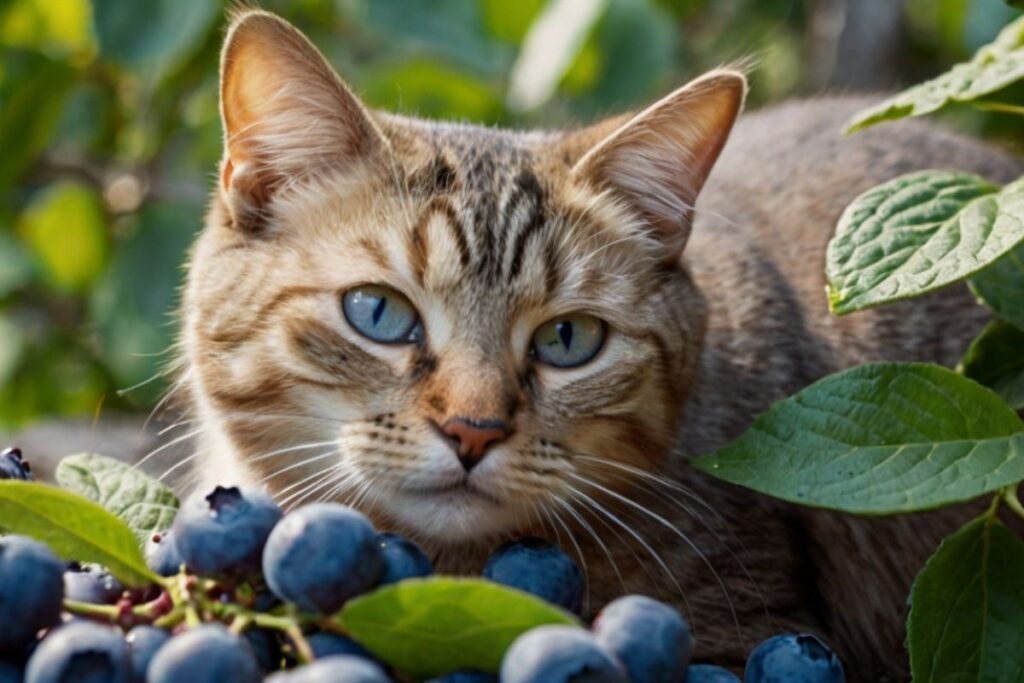
Most veterinarians agree that blueberries aren’t harmful to cats in small amounts, but they aren’t necessary either.
Dr. Sarah Green, a feline nutrition specialist, explains: “While blueberries contain beneficial nutrients for humans, cats process foods very differently. Their systems are designed for meat, not fruit. An occasional blueberry won’t hurt most healthy cats, but it shouldn’t become a regular part of their diet.”
Vets generally recommend:
- Keeping all treats to less than 10% of daily calories
- Focusing on meat-based treats when possible
- Checking with your vet before introducing human foods
- Watching for signs of digestive upset
When in doubt about any food, check with your cat’s vet first!
How Cats Process Foods Differently Than Humans
To understand why blueberries aren’t ideal for cats, it helps to know how cats’ bodies work differently from ours:
- Shorter digestive tract: Cats have shorter intestines, designed for quickly processing meat, not breaking down plant matter.
- Different enzyme production: Cats lack certain enzymes (like amylase in saliva) that help break down plant materials.
- Taste receptors: Cats can’t taste sweet flavors like we can! They lack the taste receptors for sweetness.
- Vitamin synthesis: Cats make some vitamins in their bodies (like vitamin C) that humans must get from food.
- Protein needs: Cats need much more protein in their diet than humans or even dogs.
These differences explain why foods that are healthy for us might not be right for our feline friends.
Final Thoughts on Cats and Blueberries
So, can cats eat blueberries? Yes, in very small amounts, most cats can safely have an occasional blueberry as a treat. But they don’t need them, and for some cats, they might cause minor digestive issues.
If you decide to share this tiny fruit with your cat:
- Keep portions very small
- Watch for any bad reactions
- Make it an occasional treat only
- Always wash the berries well
- Consider mashing or cutting them
Remember that your cat’s main diet should be high-quality cat food that meets their carnivore needs. Treats of any kind should make up only a small part of what they eat.
My orange boy Rio gets maybe one half-blueberry every few weeks, and that’s plenty for him. Most of the time, I stick to treats made specifically for cats or tiny bits of plain cooked meat.
What’s most important is keeping our feline friends healthy and happy. Sometimes that means saying no to those begging eyes when we eat foods that aren’t ideal for them, even when they’re healthy foods for us!

Shahriar Robin is the creator of WhatPetsCanEat.com, a passionate pet lover and dedicated cat dad to Rio, a curious two-year-old orange feline who inspired this website. With a love for animals and a knack for research, Shahriar shares trusted, easy-to-understand information to help fellow pet owners make safe, healthy food choices for their furry friends.
